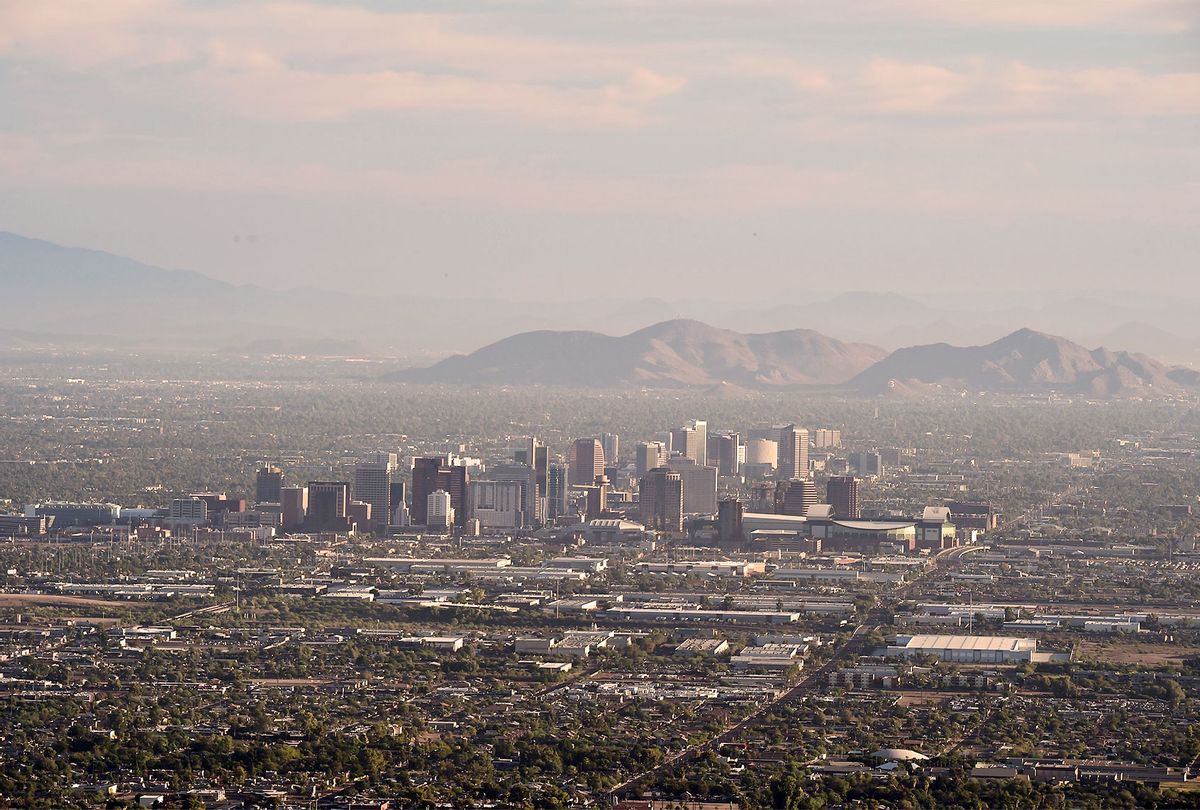Every year for the past seven years, the medical journal the Lancet has published a report summarizing the previous year's research on how climate change is affecting human health around the globe. In 2020, the journal drew an exceedingly grim conclusion: that climate change threatens to unravel 50 years of public health gains. This year's report, published Tuesday, is proof that the Lancet's 2020 report wasn't warning of a far-off threat — the health impacts of climate change are unfolding now, in real time.
The 2022 report, titled "Health at the Mercy of Fossil Fuels," says the worsening impacts of climate change "are increasingly affecting the foundations of human health and wellbeing."
Adults over the age of 65 and children younger than 1 year old experienced a cumulative 3.7 billion more heatwave days in 2021 than those vulnerable populations did on an average year between 1986 and 2005. Heat-related deaths spiked 68 percent between 2017 and 2021 compared to the period between 2000 and 2004. (The COVID-19 pandemic, which stressed hospitals and had a chilling effect on people seeking in-person treatment at emergency rooms and other healthcare facilities, is partially responsible for this massive increase.) Warming temperatures are fueling the rise of pathogens such as Vibrio, a deadly water-borne bacteria, and mosquito-driven illnesses like malaria and dengue.
Health care facilities — hospitals, emergency rooms, and medical clinics — are the first line of defense for people afflicted by the health impacts of climate change, but that blockade has been stretched to a breaking point by the pandemic, leaving millions vulnerable. "Urgent action is therefore needed to strengthen health-system resilience and to prevent a rapidly escalating loss of lives and to prevent suffering in a changing climate," the report said.
The report's assessment of the world's progress on reducing the emissions that cause climate change is even more grim. The global economy is still powered by fossil fuels; renewables comprise just 8.2 percent of global electricity generation. Power demand has grown 59 percent, even though millions of people still don't have access to reliable power, which adds to their overall health risk. (Case in point: Roughly 60 percent of health care facilities in developing nations don't have access to the electricity they need in order to provide consistent care to sick people.)
And yet, oil and gas companies are posting record profits while governments continue to subsidize fossil fuels.
"The world is at a critical juncture," the report said. The lingering pandemic, rising inflation, and Russia's war in Ukraine have created unstable global conditions that threaten to undo many nations' climate commitments. If the world backslides now, the health-related costs of doing so will be astronomical.
Though poor countries will bear the brunt of those costs, rich countries will not be immune to them. In the United States, the health impacts of rising temperatures and fossil fuel use, particularly air pollution and extreme heat, are already being felt. A policy brief written by experts from more than 80 U.S. institutions, published as an accompaniment to the Lancet report on Tuesday, illuminates the climate-related death toll in the U.S. The policy brief says that particulate matter air pollution — tiny airborne particles that can get trapped in the lungs and bloodstream — killed 32,000 people in the U.S. in 2020, and approximately 12,000 of those deaths, 37 percent, were directly linked to the burning of fossil fuels.
Extreme heat is also on the rise in the U.S.; 2021 was the sixth-hottest year on record. It's no surprise, then, that heat-related mortality has jumped 74 percent for people over the age of 65 in the U.S. since the period between 2000 and 2004. But the health impacts of rising temperatures are not distributed equally. The policy brief cites government data showing that the regions of the country that are projected to experience the highest increases in heat-related deaths are 40 percent more likely to be home to Black people. And the people most likely to be exposed to extreme heat are outdoor laborers, people experiencing homelessness, and incarcerated individuals.
"When I'm treating a patient, if something I'm doing to help them isn't working, I don't keep doing the same thing," Renee N. Salas, a doctor at Massachusetts General Hospital and the lead author of the policy brief, told reporters. "I do something different. And the same is true for the climate shocks we're experiencing."
Not all hope is lost, both the Lancet report and the U.S. policy brief say. Recent policy measures in the U.S. — namely the Inflation Reduction Act of 2022, which is predicted to reduce domestic emissions 40 percent below 2005 levels by the end of the decade — will help reduce air pollution and its associated health impacts.
And much more can be done to limit the damage caused by climate change, according to the U.S. policy brief. In addition to reaching net-zero emissions in its energy sector, the brief says the U.S. should decarbonize its transportation sector, stop approving new fossil fuel developments, phase out subsidies for oil and gas, invest in climate adaptation (particularly in vulnerable communities), and chip in more money to the global pot of green financing for developing countries.
On the international front, the Lancet report said that the heartening news is that some 86 percent of countries' current climate targets mention health as an important metric of success. And the war in Ukraine and the global energy crisis have prompted many nations to think more carefully about their mix of fossil fuel and renewable energies. The media is doing a better job of connecting the dots between climate change and public health for its audiences — coverage of these interrelated issues increased 27 percent between 2020 and 2021, according to the report. And hundreds of local governments around the world have begun conducting city-level climate change assessments that take public health into account. Many of those cities listed heat waves and bad air quality among their most prominent health threats last year.
"At this critical juncture, an immediate, health-centered response can still secure a future in which world populations can not only survive, but thrive," the report said. The missing ingredient, as always, is a healthy dose of political will.




Shares